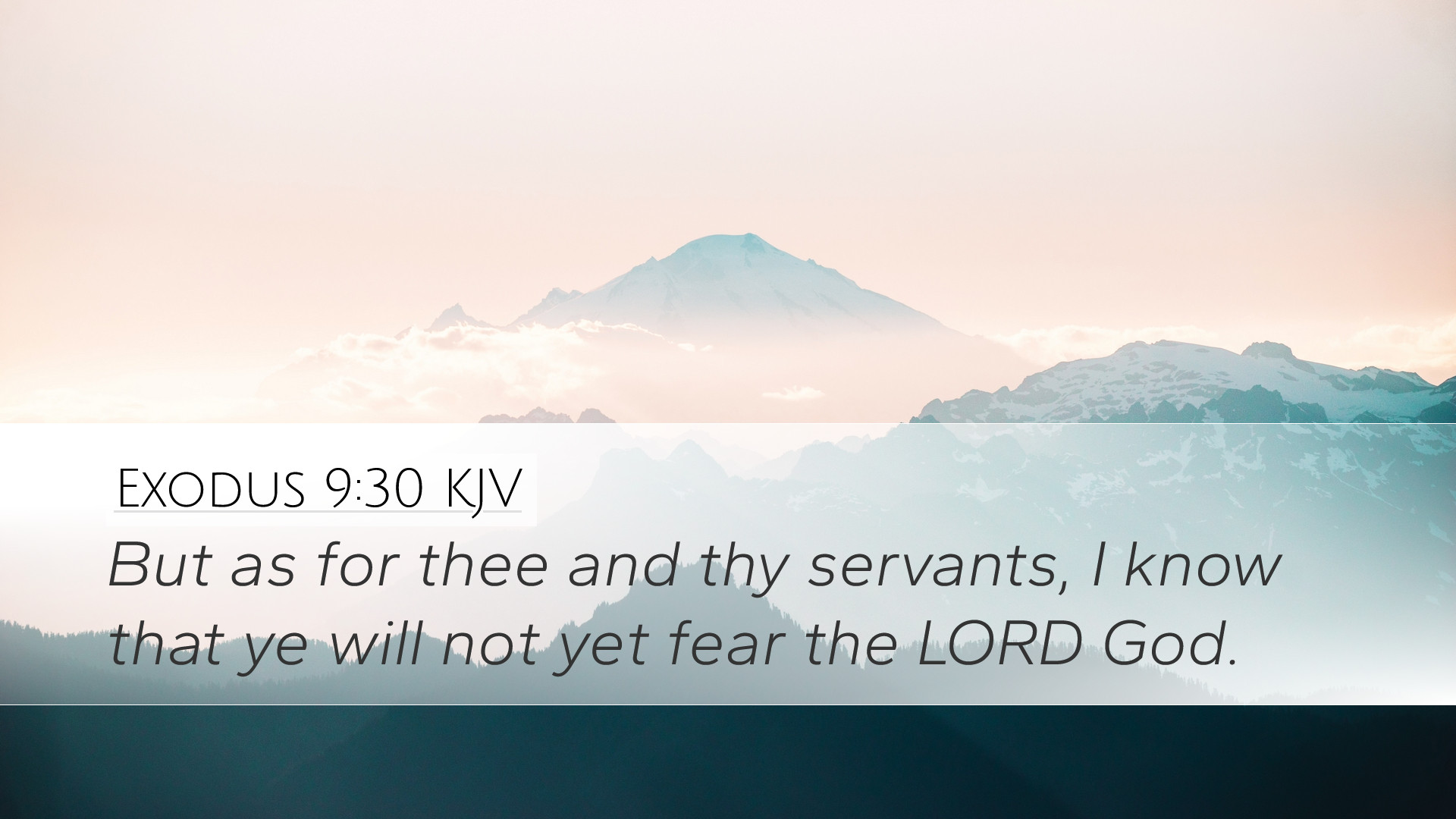Commentary on Exodus 9:30
Exodus 9:30: "But as for thee and thy servants, I know that ye will not yet fear the Lord God."
Introduction
This verse is part of the narrative surrounding the plagues that God inflicted upon Egypt in order to compel Pharaoh to release the Israelites from slavery. It reflects God's omniscience concerning the hearts and intentions of those opposed to His will. Commentaries by Matthew Henry, Albert Barnes, and Adam Clarke provide deep insight into this pivotal moment in the history of Israel and the sinful nature of man.
Divine Knowledge and Human Rebellion
Matthew Henry emphasizes the profound concept of divine omniscience demonstrated in this verse. He points out that God, in His infinite wisdom, knows the stubbornness of Pharaoh's heart. Even amid successive plagues, Pharaoh's attitude remains unchanged. This highlights a critical aspect of humanity’s sinful nature: the propensity to resist God's will despite clear evidence of His authority.
God's Awareness of Human Condition
This verse stresses that God is not taken by surprise by human defiance. Albert Barnes reinforces this idea by explaining that God’s declaration regarding Pharaoh and his servants signifies a lament over their unyielding nature. Pharaoh had witnessed miraculous signs and wonders yet remained unrepentant. This serves as a cautionary tale for believers about the dangers of hardening one’s heart.
The Nature of Fear Toward God
The term 'fear' in this verse encapsulates a complex idea—not merely fear as in terror, but a reverential acknowledgment of God’s power and authority. Adam Clarke points out that true fear of God leads to humility and obedience. However, Pharaoh's refusal to fear God signifies a broader unwillingness to submit to divine authority.
Implications of Disregarding God's Authority
As seen throughout the narrative, Pharaoh’s continual disregard for God's will leads to devastating consequences—not just for himself, but for all of Egypt. Matthew Henry notes that Pharaoh’s rejection puts everyone at risk, illustrating how leaders have a profound impact on a nation’s relationship with God. Such disobedience can lead to collective judgment.
The Persistence of Unbelief
Albert Barnes further elaborates that Pharaoh’s hardened heart is a demonstration of the persistence of unbelief. The observation that Pharaoh would not yet fear God serves as a poignant reminder that stubbornness in the face of evidence often leads to spiritual blindness. This can encourage theologians and scholars to reflect on contemporary parallels in leadership and individual spirituality.
Spiritual Blindness in Leadership
This theme of spiritual blindness extends beyond Pharaoh, as it invites modern readers to examine their own relationship with God. It challenges pastors and theologians to consider how leaders today might refuse to acknowledge divine authority, leading others astray. It raises crucial questions about accountability and the responsibilities of those in power.
Calls to Repentance
Amidst this narrative of rebellion, there is an implicit call to repentance. Each plague serves as a divine invitation to recognize God’s sovereignty. Matthew Henry suggests that understanding God's patience and mercy is essential for genuine fear and reverence. The ongoing resistance of Pharaoh invites reflection on the necessity for humility and turning toward God in times of adversity.
The Role of Suffering in Leading to Repentance
Albert Barnes notes the function of suffering as a catalyst for reflective thought. In the context of Exodus, the suffering inflicted upon Egypt was intended to serve as a divine lesson. This concept resonates with the understanding that trials can lead to personal and communal repentance when viewed through the lens of faith.
Conclusion
Exodus 9:30 provides valuable insights into God’s omniscience, human rebellion, and the dynamics of divine judgment. The reflections from esteemed commentators such as Matthew Henry, Albert Barnes, and Adam Clarke underscore the seriousness of recognizing God’s authority and the implications of resisting His will. For pastors, students, theologians, and scholars, this text serves as a profound reminder of the necessity of humility, the danger of hardening one's heart, and the importance of yielding to God's purpose in every aspect of life.


